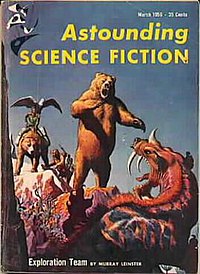
Summary
"Exploration Team" is a science fiction novelette by American writer Murray Leinster, originally published in the March 1956 issue of Astounding Science Fiction. It won the Hugo Award for Best Novelette in 1956.[1]
| "Exploration Team" | |
|---|---|
| Short story by Murray Leinster | |
 Illustration by Ed Emshwiller | |
| Country | United States |
| Language | English |
| Genre(s) | Science fiction |
| Publication | |
| Published in | Astounding Science Fiction |
| Publication type | Periodical |
| Publisher | Street & Smith |
| Media type | Magazine |
| Publication date | March 1956 |
| Series | Colonial Survey |
Writing in 1998, Gardner Dozois described "Exploration Team" as "taut, suspenseful and scary". He went on to note that it is "practically the model of how to write an intricate and intelligent adventure set on an alien world".[2]
"Exploration Team" is one of the works in Leinster's "Colonial Survey" series.[3] It is also one of the four novelettes that were re-written and included in Leinster's fix-up novel Colonial Survey, where it appears as a chapter titled "Combat Team".[4]
Plot summary edit
The novelette is set in a future time during which humanity has begun colonizing planets in other solar systems. The Colonial Survey agency has decreed the (fictional) planet of Loren Two to be off-limits, due to the extremely dangerous native animals. Despite its decree, the Colonial Survey has authorized an experimental colony on the planet. At about the same time, the overcrowded inhabitants of another planet have established an unauthorized reconnaissance station on Loren Two. Neither group is aware of the other's existence. The authorized colony is well-funded, consisting of one dozen persons equipped with advanced robotic and other equipment. The unauthorized reconnaissance team consists of a single man, Huyghens (no first name given), accompanied by an eagle and four specially-bred Kodiak bears. The bears have been bred (the story uses the term "mutated") so as to have the psychological profile of dogs. They are friendly to humans and able to work in teams.
When the story begins, Huyghens receives a signal indicating that a ship is about to land near his station. The ship drops off its sole passenger, an officer with the Colonial Survey named Roane (no first name given), and then departs. Roane soon learns that Huyghens is an illegal trespasser on the planet and that his (Huyghens') signal beacon was not that of the authorized colony. For his part, Huyghens is surprised to learn that there was an authorized colony on the same planet. The two men put their minds to the question of why the authorized colony's signal beacon was not working and soon determine that it has been replaced with a low-technology emergency beacon. From this, the two men surmise that the authorized colony has been overrun by the indigenous predators, but that some colonists might still be alive in the mine tunnels that the colony was expected to have dug.
Huyghens and Roane, along with the bears and the eagle, undertake a dangerous cross-country trek to determine the status of the authorized colony.
Publication history edit
Other than its original publication in the March 1956 issue of Astounding Science Fiction, "Exploration Team" did not see any other magazine publication until the May 1962 issue (No. 43) of the French-language magazine Satellite, as "Les meilleurs amis de l'homme" ("Man's Best Friends").
The story has been anthologized at least ten times, including thrice in Italian translation (one under the title "Colonia vietata" ("Illegal Colony")) and once in German. The story also appears in two collections devoted to Leinster's work—First Contacts (NESFA Press, 1998) and an Italian-language collection, the summer 1985 issue of Millemondi, as well as Volume 1 of The Hugo Winners series.
The foregoing was taken from the story's listing in the Internet Speculative Fiction Database (for which see the External Links section below). More detail on its publication history can be found at that listing.
Reception edit
Floyd C. Gale said in 1963 that the story was the best in The Hugo Winners Volume 1, praising Leinster for being able to adapt to changes in science fiction during a career of several decades.[5]
References edit
- ^ "1956 Hugo Awards". World Science Fiction Society. Archived from the original on May 7, 2011. Retrieved April 19, 2010.
- ^ Dozois, Gardner (1998). The Good Old Stuff: Adventure SF in the Grand Tradition. New York: St. Martin's Griffin. p. 155. ISBN 0-312-19275-4.
- ^ "Colonial Survey (series)". Internet Speculative Fiction Database. Retrieved October 16, 2015.
- ^ "Colonial Survey (novel)". Internet Speculative Fiction Database. Retrieved October 16, 2015.
- ^ Gale, Floyd C. (April 1963). "Galaxy's 5 Star Shelf". Galaxy Science Fiction. pp. 155–159.
External links edit
- Exploration Team title listing at the Internet Speculative Fiction Database
- Exploration Team at Project Gutenberg
- Exploration Team public domain audiobook at LibriVox


